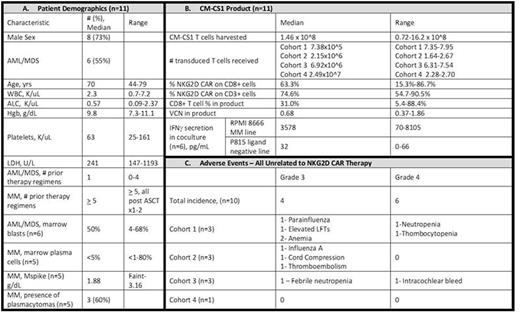Abstract
Introduction: Conventional CAR-T cells express a single chain antibody variable fragment that restricts recognition to one tumor antigen and a limited set of cancers. This study employs a novel CAR fusing full-length human NKG2D with the CD3z signaling domain. In autologous transduced CM-CS1 T cells, NKG2D CAR receives endogenous costimulation via DAP10 to target multiple NKG2D-ligands that are upregulated in solid and hematologic malignancies but absent or poorly expressed on healthy tissues.
Methods: A phase 1 dose-escalation study to establish safety and feasibility of a single infusion of CM-CS1 T cells without lymphodepleting conditioning enrolled subjects with AML/MDS-RAEB or relapsed/refractory progressive multiple myeloma (MM) without standard therapy options (NCT02203825). Eligibility criteria included suitable organ function, no CNS disease, no prior allogeneic SCT or adoptive T-cell therapy, no therapy within 3 weeks prior to infusion, no immune suppression, and no uncontrolled infection. Dose-escalation spanned 4 cohorts [half-log increments from 1x106 to 3x107 CM-CS1 T cells] according to a 3+3 design. DLTs included ≥ Grade 3 non-hematologic toxicity or ≥ Grade 2 autoimmune toxicity related to CAR T cells. Initial assessment was at 28 days. At least 1 AML/MDS and 1 MM subject were mandated in each dose level. Manufacturing included PBMC stimulation with OKT3 and IL-2 followed by 2 rounds of retroviral transduction at DFCI's Cell Manipulation Core Facility. Vector copy number (VCN) and replication-competent retrovirus (RCR) testing were performed on whole blood and PBMCs, respectively, using quantitative PCR.
Results: From April 2015 to July 2016, 11 subjects were infused, and 10 completed the DLT period. Eight of 11 were male, 6 had AML/MDS, and median age was 70 (range 44 to 79) (Panel A). Median WBC was 2.3 (range 0.7 to 7.2 K/uL); median ALC was 0.74 (range 0.09-2.37 K/uL). Five had cells manufactured from peripheral blood; 6 underwent apheresis. Median percentage of blasts in bone marrow for AML/MDS patients was 50% (range 4-68%). All myeloma patients had undergone ≥ 5 therapies including ≥1 autologous SCT. Four of the 6 AML/MDS patients had secondary disease, 3 had complex cytogenetics, 3 had p53 mutations, and 1 had a FLT3-ITD mutation.
Dose-escalation proceeded from 1x106 to 3x107 CM-CS1 T cells. All 11 products passed release criteria, and there were no infusion reactions. Products consisted of median 97.2% CD3+ cells and 31.0% CD8+ cells, with vector-specific NKG2D expression on median 74.6% of CD3+ and 66.3% of CD8+ cells (Panel B). The first 10 subjects completed their 28 day evaluation period without DLTs. There were no cases of cytokine release syndrome, cell-related neurotoxicity, auto-immunity, or CAR T-related death. SAEs included a Grade 4 intracochlear bleed and an episode each of grade 4 neutropenia and thrombocytopenia deemed related to disease progression. Forty percent of patients experienced some Grade 3 toxicity, all related to underlying disease or a complication thereof (Panel C).
At these initial cell doses, no patient to date has had objective tumor response at the 28 day evaluation mark. Nine initiated subsequent therapies; there have been 4 deaths secondary to disease or complications of subsequent therapies. However, cases of unexpected survival without further therapy and responses to subsequent treatments were noted. For example a patient with p53-mutated AML survived 4 months despite 50% blasts at infusion, and another entered PR at 6+months after cells on an IDH-1 inhibitor with <5% IDH and 54% p53 mutation burden at initiation. RCR testing at 3 (n=6) and 6 months (n=1) was negative. As anticipated, no CAR T cell persistence has been detected at or beyond 2 weeks, with 1 exception. CAR T cell DNA has been detected sporadically from 1 hour to 1 week after infusion.
Conclusion: In the first 3+ dose-escalation cohorts of patients with AML/MDS and myeloma, a single dose of CM-CS1 T cells without lymphodepletion was feasible and well-tolerated, with no DLTs. CAR T cells generally have not persisted beyond 1 week, consistent with pre-clinical models. Correlative analyses including post-infusion immunophenotyping are in process. Future studies of multiple infusions of NKG2D CAR T cells in both hematologic malignancies and solid tumors at the higher cell doses associated with efficacy in pre-clinical models are in planning.
Murad:Celdara Medical, LLC: Employment. Reder:Celdara Medical, LLC: Employment. Sentman:Celdara Medical, LLC: Membership on an entity's Board of Directors or advisory committees, Other: Holds patents on this technology. Wade:Celdara Medical, LLC: Employment. Schmucker:Celdara Medical, LLC: Employment. Lehmann:Celyad, SA: Employment. Snykers:Celyad, SA: Employment. Allen:Celyad, SA: Employment. Stone:Celator: Consultancy; Jansen: Consultancy; Novartis: Consultancy; Merck: Consultancy; ONO: Consultancy; Sunesis Pharmaceuticals: Consultancy; Roche: Consultancy; Celgene: Consultancy, Membership on an entity's Board of Directors or advisory committees; Juno Therapeutics: Consultancy; Xenetic Biosciences: Consultancy; Agios: Consultancy; Abbvie: Consultancy, Membership on an entity's Board of Directors or advisory committees; Seattle Genetics: Consultancy; Pfizer: Consultancy; Karyopharm: Consultancy; Amgen: Consultancy. Soiffer:Kiadis: Membership on an entity's Board of Directors or advisory committees; Juno: Consultancy. Dranoff:Novartis: Employment. Ritz:Kiadis: Membership on an entity's Board of Directors or advisory committees.
Author notes
Asterisk with author names denotes non-ASH members.


This feature is available to Subscribers Only
Sign In or Create an Account Close Modal